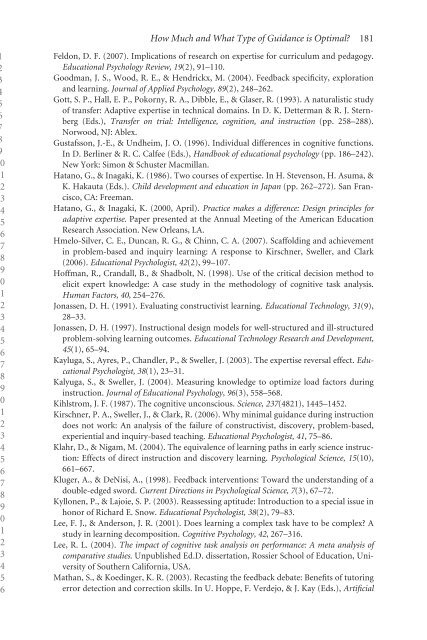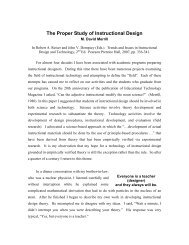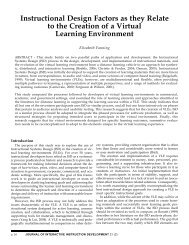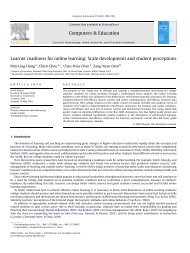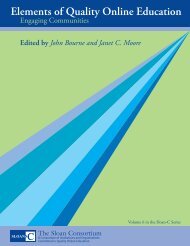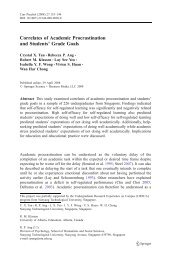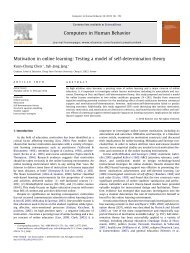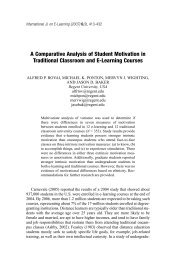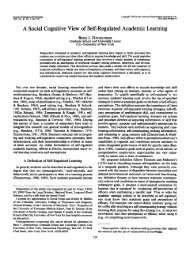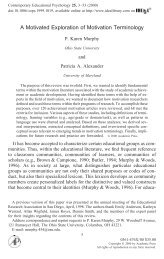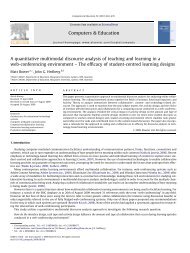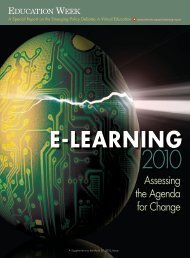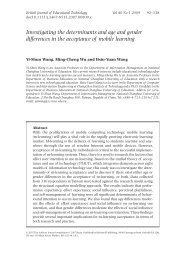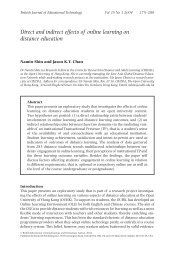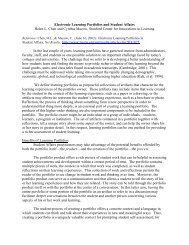9 How Much and What Type of Guidance is Optimal for Learning ...
9 How Much and What Type of Guidance is Optimal for Learning ...
9 How Much and What Type of Guidance is Optimal for Learning ...
Create successful ePaper yourself
Turn your PDF publications into a flip-book with our unique Google optimized e-Paper software.
<strong>How</strong> <strong>Much</strong> <strong>and</strong> <strong>What</strong> <strong>Type</strong> <strong>of</strong> <strong>Guidance</strong> <strong>is</strong> <strong>Optimal</strong>? 1810123456789012345678901234567890123456Feldon, D. F. (2007). Implications <strong>of</strong> research on expert<strong>is</strong>e <strong>for</strong> curriculum <strong>and</strong> pedagogy.Educational Psychology Review, 19(2), 91–110.Goodman, J. S., Wood, R. E., & Hendrickx, M. (2004). Feedback specificity, exploration<strong>and</strong> learning. Journal <strong>of</strong> Applied Psychology, 89(2), 248–262.Gott, S. P., Hall, E. P., Pokorny, R. A., Dibble, E., & Glaser, R. (1993). A natural<strong>is</strong>tic study<strong>of</strong> transfer: Adaptive expert<strong>is</strong>e in technical domains. In D. K. Detterman & R. J. Sternberg(Eds.), Transfer on trial: Intelligence, cognition, <strong>and</strong> instruction (pp. 258–288).Norwood, NJ: Ablex.Gustafsson, J.-E., & Undheim, J. O. (1996). Individual differences in cognitive functions.In D. Berliner & R. C. Calfee (Eds.), H<strong>and</strong>book <strong>of</strong> educational psychology (pp. 186–242).New York: Simon & Schuster Macmillan.Hatano, G., & Inagaki, K. (1986). Two courses <strong>of</strong> expert<strong>is</strong>e. In H. Stevenson, H. Asuma, &K. Hakauta (Eds.). Child development <strong>and</strong> education in Japan (pp. 262–272). San Franc<strong>is</strong>co,CA: Freeman.Hatano, G., & Inagaki, K. (2000, April). Practice makes a difference: Design principles <strong>for</strong>adaptive expert<strong>is</strong>e. Paper presented at the Annual Meeting <strong>of</strong> the American EducationResearch Association. New Orleans, LA.Hmelo- Silver, C. E., Duncan, R. G., & Chinn, C. A. (2007). Scaffolding <strong>and</strong> achievementin problem- based <strong>and</strong> inquiry learning: A response to Kirschner, Sweller, <strong>and</strong> Clark(2006). Educational Psycholog<strong>is</strong>t, 42(2), 99–107.H<strong>of</strong>fman, R., Cr<strong>and</strong>all, B., & Shadbolt, N. (1998). Use <strong>of</strong> the critical dec<strong>is</strong>ion method toelicit expert knowledge: A case study in the methodology <strong>of</strong> cognitive task analys<strong>is</strong>.Human Factors, 40, 254–276.Jonassen, D. H. (1991). Evaluating constructiv<strong>is</strong>t learning. Educational Technology, 31(9),28–33.Jonassen, D. H. (1997). Instructional design models <strong>for</strong> well- structured <strong>and</strong> ill- structuredproblem- solving learning outcomes. Educational Technology Research <strong>and</strong> Development,45(1), 65–94.Kayluga, S., Ayres, P., Ch<strong>and</strong>ler, P., & Sweller, J. (2003). The expert<strong>is</strong>e reversal effect. EducationalPsycholog<strong>is</strong>t, 38(1), 23–31.Kalyuga, S., & Sweller, J. (2004). Measuring knowledge to optimize load factors duringinstruction. Journal <strong>of</strong> Educational Psychology, 96(3), 558–568.Kihlstrom, J. F. (1987). The cognitive unconscious. Science, 237(4821), 1445–1452.Kirschner, P. A., Sweller, J., & Clark, R. (2006). Why minimal guidance during instructiondoes not work: An analys<strong>is</strong> <strong>of</strong> the failure <strong>of</strong> constructiv<strong>is</strong>t, d<strong>is</strong>covery, problem- based,experiential <strong>and</strong> inquiry- based teaching. Educational Psycholog<strong>is</strong>t, 41, 75–86.Klahr, D., & Nigam, M. (2004). The equivalence <strong>of</strong> learning paths in early science instruction:Effects <strong>of</strong> direct instruction <strong>and</strong> d<strong>is</strong>covery learning. Psychological Science, 15(10),661–667.Kluger, A., & DeN<strong>is</strong>i, A., (1998). Feedback interventions: Toward the underst<strong>and</strong>ing <strong>of</strong> adouble- edged sword. Current Directions in Psychological Science, 7(3), 67–72.Kyllonen, P., & Lajoie, S. P. (2003). Reassessing aptitude: Introduction to a special <strong>is</strong>sue inhonor <strong>of</strong> Richard E. Snow. Educational Psycholog<strong>is</strong>t, 38(2), 79–83.Lee, F. J., & Anderson, J. R. (2001). Does learning a complex task have to be complex? Astudy in learning decomposition. Cognitive Psychology, 42, 267–316.Lee, R. L. (2004). The impact <strong>of</strong> cognitive task analys<strong>is</strong> on per<strong>for</strong>mance: A meta analys<strong>is</strong> <strong>of</strong>comparative studies. Unpubl<strong>is</strong>hed Ed.D. d<strong>is</strong>sertation, Rossier School <strong>of</strong> Education, University<strong>of</strong> Southern Cali<strong>for</strong>nia, USA.Mathan, S., & Koedinger, K. R. (2003). Recasting the feedback debate: Benefits <strong>of</strong> tutoringerror detection <strong>and</strong> correction skills. In U. Hoppe, F. Verdejo, & J. Kay (Eds.), Artificial


